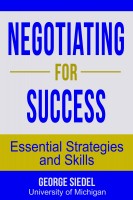Negotiating for Success: Essential Strategies and Skills by George J. Siedel
>> Saturday, October 25, 2014

Negotiation is also the key to business success. No organization can survive without contracts that produce profits. At a strategic level, businesses are concerned with value creation and achieving competitive advantage. But the success of high-level business strategies depends on contracts made with suppliers, customers and other stakeholders. Contracting capability—the ability to negotiate and perform successful contracts—is the most important function in any organization.
This book is designed to help you achieve success in your personal negotiations and in your business transactions. The book is unique in two ways. First, the book not only covers negotiation concepts, but also provides practical actions you can take in future negotiations. This includes a Negotiation Planning Checklist and a completed example of the checklist for your use in future negotiations.
The book also includes (1) a tool you can use to assess your negotiation style; (2) examples of “decision trees,” which are useful in calculating your alternatives if your negotiation is unsuccessful; (3) a three-part strategy for increasing your power during negotiations; (4) a practical plan for analyzing your negotiations based on your reservation price, stretch goal, most-likely target, and zone of potential agreement; (5) clear guidelines on ethical standards that apply to negotiations; (6) factors to consider when deciding whether you should negotiate through an agent; (7) psychological tools you can use in negotiations—and traps to avoid when the other side uses them; (8) key elements of contract law that arise during negotiations; and (9) a checklist of factors to use when you evaluate your performance as a negotiator.
Second, the book is unique in its holistic approach to the negotiation process. Other books often focus narrowly either on negotiation or on contract law. Furthermore, the books on negotiation tend to focus on what happens at the bargaining table without addressing the performance of an agreement. These books make the mistaken assumption that success is determined by evaluating the negotiation rather than evaluating performance of the agreement. Similarly, the books on contract law tend to focus on the legal requirements for a contract to be valid, thus giving short shrift to the negotiation process that precedes the contract and to the performance that follows.
In the real world, the contracting process is not divided into independent phases. What happens during a negotiation has a profound impact on the contract and on the performance that follows. The contract’s legal content should reflect the realities of what happened at the bargaining table and the performance that is to follow. This book, in contrast to others, covers the entire negotiation process in chronological order beginning with your decision to negotiate and continuing through the evaluation of your performance as a negotiator.
A business executive in one of the negotiation seminars the author teaches as a University of Michigan professor summarized negotiation as follows: “Life is negotiation!” No one ever stated it better. As a mother with young children and as a company leader, the executive realized that negotiations are pervasive in our personal and business lives. With its emphasis on practical action, and with its chronological, holistic approach, this book provides a roadmap you can use when navigating through your life as a negotiator.
George Siedel is the Williamson Family Professor of Business Administration and the Thurnau Professor of Business Law at the University of Michigan. He teaches negotiation in the MBA program at Michigan’s Ross School of Business and in seminars around the world to business leaders, entrepreneurs, attorneys, physicians, athletic directors, and judges.
Professor Siedel completed his graduate studies at the University of Michigan and Cambridge University. He has served as a visiting professor at Stanford University and Harvard University and as a Visiting Scholar at University of California, Berkeley. As a Fulbright Scholar, he held a Distinguished Chair in the Humanities and Social Sciences.
Professor Siedel has received several national research awards including the Maurer Award, the Ralph Bunche Award, and the Hoeber Award. He has also received numerous teaching awards, including the 2014 Executive Program Professor of the Year Award from CIMBA, a consortium of thirty-six leading universities committed to international education.
Price: $9.99 USD




0 comments:
Post a Comment